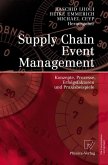Large Event Security Planning and Emergency Management
Herausgeber: Black, David R.; Dietz, J. Eric
63,99 €
inkl. MwSt.
Versandkostenfrei*
Erscheint vorauss. 5. Januar 2026
Melden Sie sich
hier
hier
für den Produktalarm an, um über die Verfügbarkeit des Produkts informiert zu werden.

32 °P sammeln
Large Event Security Planning and Emergency Management
Herausgeber: Black, David R.; Dietz, J. Eric
- Gebundenes Buch
This book examines the safety and security of event planning, from small and mid-sized events to large scale events requiring cross-jurisdictional and, potentially, national authority involvement. Natural (earthquakes, tsunamis, severe weather) and man-made (terrorism, chemical spills, train derailments) disasters present challenges for large event planners. Risk assessments are covered as well as the event planning process, response planning, crisis management, and the decision-making and chain-of-authority framework necessary to take critical action during and immediately following a crisis.
Andere Kunden interessierten sich auch für
![Large-Scale Construction Project Management Large-Scale Construction Project Management]() Yan TanLarge-Scale Construction Project Management153,99 €
Yan TanLarge-Scale Construction Project Management153,99 €![Supply Chain Event Management Supply Chain Event Management]() Raschid Ijioui / Heike Emmerich / Michael Ceyp (eds.)Supply Chain Event Management89,99 €
Raschid Ijioui / Heike Emmerich / Michael Ceyp (eds.)Supply Chain Event Management89,99 €![Supply Chain Event Management Supply Chain Event Management]() Christian HunewaldSupply Chain Event Management49,99 €
Christian HunewaldSupply Chain Event Management49,99 €![The Business of Leisure The Business of Leisure]() Ken RobertsThe Business of Leisure55,99 €
Ken RobertsThe Business of Leisure55,99 €![Standort-Marketing und Event-Management Standort-Marketing und Event-Management]() Christof GrafStandort-Marketing und Event-Management69,99 €
Christof GrafStandort-Marketing und Event-Management69,99 €![Event Marketing Event Marketing]() Chris A. PrestonEvent Marketing74,99 €
Chris A. PrestonEvent Marketing74,99 €![Tile Drainage: An Explanation of How and Why Tile Will Benefit a Large Percentage of Our Lands and Increase Our Incomes: Together Wit Tile Drainage: An Explanation of How and Why Tile Will Benefit a Large Percentage of Our Lands and Increase Our Incomes: Together Wit]() James A. KingTile Drainage: An Explanation of How and Why Tile Will Benefit a Large Percentage of Our Lands and Increase Our Incomes: Together Wit33,99 €
James A. KingTile Drainage: An Explanation of How and Why Tile Will Benefit a Large Percentage of Our Lands and Increase Our Incomes: Together Wit33,99 €-
-
-
This book examines the safety and security of event planning, from small and mid-sized events to large scale events requiring cross-jurisdictional and, potentially, national authority involvement. Natural (earthquakes, tsunamis, severe weather) and man-made (terrorism, chemical spills, train derailments) disasters present challenges for large event planners. Risk assessments are covered as well as the event planning process, response planning, crisis management, and the decision-making and chain-of-authority framework necessary to take critical action during and immediately following a crisis.
Hinweis: Dieser Artikel kann nur an eine deutsche Lieferadresse ausgeliefert werden.
Hinweis: Dieser Artikel kann nur an eine deutsche Lieferadresse ausgeliefert werden.
Produktdetails
- Produktdetails
- Verlag: Taylor & Francis Inc
- Seitenzahl: 320
- Erscheinungstermin: 5. Januar 2026
- Englisch
- Abmessung: 234mm x 156mm
- ISBN-13: 9781498701358
- ISBN-10: 1498701353
- Artikelnr.: 59982466
- Herstellerkennzeichnung
- Libri GmbH
- Europaallee 1
- 36244 Bad Hersfeld
- gpsr@libri.de
- Verlag: Taylor & Francis Inc
- Seitenzahl: 320
- Erscheinungstermin: 5. Januar 2026
- Englisch
- Abmessung: 234mm x 156mm
- ISBN-13: 9781498701358
- ISBN-10: 1498701353
- Artikelnr.: 59982466
- Herstellerkennzeichnung
- Libri GmbH
- Europaallee 1
- 36244 Bad Hersfeld
- gpsr@libri.de
David R. Black, PhD, MPH, HSPP, CHES, CPPE, FASHA, FSBM, FAAHB, FAAHE, is a professor of public health at Purdue University in the Department of Health and Kinesiology and holds adjunct appointments in Health Sciences, Nutrition Sciences, and Nursing. He is also the associate director of the Homeland Security Institute (PHSI). He completed his doctorate in psychology at Stanford University and his MPH degree in Health Promotion and Behavioral Epidemiology at San Diego State University. He is fellow of five different health organizations and has received more than 40 federal, national, and state awards or recognitions for his contributions to public health. He is a retired Army Colonel and a graduate of the US Army War College. The combination of his public health and military education and training were a natural segue to focus on catastrophic events of all sizes. The relationship between public health and homeland security has been symbiotic among administrative units, faculty, and students. Examples of multidisciplinary projects encompass statewide pandemic training exercises and assessments of agency or state disaster plans; development of plans and evaluation procedures and methods for small, medium, and large events; training individuals to properly and efficiently screen for events; use military leadership models for public health and disaster preparedness by focusing on and teaching appropriate command structure based on the size of the event; and how to coordinate and use resources to mitigate unnecessary morbidity and mortality related to event evacuation. J. Eric Dietz, PhD, PE, is the director of the Purdue Homeland Security Institute and professor of computer and information technology at Purdue University. Dr. Dietz¿s research interests include optimization of emergency response, homeland security and defense, energy security, and engaging veterans in higher education. As a director in Purdue¿s Discovery Park, Dr. Dietz is responsible for the catalysis of the Purdue¿s homeland security research enterprise, increasing the impact of Purdue on society, and organizing large multidisciplinary projects within Purdue. Prior to his current responsibilities, Dr. Dietz was on loan from Purdue to Indianäs Governor as the founding executive director for The Indiana Department of Homeland Security, a new state agency responsible for planning and response placing the responsibility for the safety and security of 6.2 million Indiana residents. His duties included reorganization of five state agencies into functional divisions responsible for the development of plans, training, and exercise to improve the emergency response for Indiana governmental functions. He also led the Governor¿s Counterterrorism and Security Council, a multiagency organization guiding Indianäs homeland security policy. The comprehensive emergency management command and control systems he developed were tested by seven Presidential Declared Disasters and emergencies including Indianäs task force response to Hurricane Katrina. Under his leadership, Indiana added new statutory programs and funding that enhanced statewide emergency services. His leadership also helped accomplish a long sought objective to the fire service in the Indiana State Fire Training System to offer standardized training to over 26,000 Indiana first responders. Dr. Dietz led the formation of the Indiana Intelligence Fusion Center to coordinate all crimes and terrorism law enforcement intelligence. He also established a state disaster fund which provided process and funding to support individuals and local government following disasters. He was a board member for several national and regional boards which included the Central United States Earthquake Consortium, the Certified Emergency Manager Commission, Homeland Security Consortium, the National Weather Service Storm Ready program, Federal Emergency Management Agency Region 5 Advisory Council and National Emergency Managers Association. Retiring as a Lieutenant Colonel from the U.S. Army in 2004, Dr. Dietz led a number of Army Acquisition programs throughout his military career including power systems, chemical sensors and command and control systems. Balancing a career between tactical and research jobs, he was able to effectively lead the military as well as the civilian workforce in projects of technical sophistication between detections systems to command and control systems.
Education. Event Size and Emergency Response Requirements.
Interdisciplinary Approach. Utilizing the National Incident Management
System and Incident Command. Public Safety and Large Events: A Perspective
of Best Practices in Higher Education. Arena Security Management: A
Different Perspective. Public Health Concerns for Large Events. Resilience
Building for Large Event Planners. IT Management. Communication Other than
Social Media. Policy and Law. Weather Monitoring. Drone Use: The Future of
Surveillance. Evacuation Planning. Active Shooter. Structural Safety 2011:
Indiana State Fair Disaster and the Policies that Followed. Bomb Threats
and Suspicious Packages: What We Can Learn from the Boston Marathon
Bombing. Promotion. Security Line Management Through Modeling. Implementing
Social Media for Large Public Events. Managing a Mass Casualty Incident for
Large Events. Media Coverage and Issues. Stressful events for Victims and
Responders. People with Disabilities. Conclusion-Challenges to Security
Planning. International Issues in Large Event Security.
Interdisciplinary Approach. Utilizing the National Incident Management
System and Incident Command. Public Safety and Large Events: A Perspective
of Best Practices in Higher Education. Arena Security Management: A
Different Perspective. Public Health Concerns for Large Events. Resilience
Building for Large Event Planners. IT Management. Communication Other than
Social Media. Policy and Law. Weather Monitoring. Drone Use: The Future of
Surveillance. Evacuation Planning. Active Shooter. Structural Safety 2011:
Indiana State Fair Disaster and the Policies that Followed. Bomb Threats
and Suspicious Packages: What We Can Learn from the Boston Marathon
Bombing. Promotion. Security Line Management Through Modeling. Implementing
Social Media for Large Public Events. Managing a Mass Casualty Incident for
Large Events. Media Coverage and Issues. Stressful events for Victims and
Responders. People with Disabilities. Conclusion-Challenges to Security
Planning. International Issues in Large Event Security.
Education. Event Size and Emergency Response Requirements.
Interdisciplinary Approach. Utilizing the National Incident Management
System and Incident Command. Public Safety and Large Events: A Perspective
of Best Practices in Higher Education. Arena Security Management: A
Different Perspective. Public Health Concerns for Large Events. Resilience
Building for Large Event Planners. IT Management. Communication Other than
Social Media. Policy and Law. Weather Monitoring. Drone Use: The Future of
Surveillance. Evacuation Planning. Active Shooter. Structural Safety 2011:
Indiana State Fair Disaster and the Policies that Followed. Bomb Threats
and Suspicious Packages: What We Can Learn from the Boston Marathon
Bombing. Promotion. Security Line Management Through Modeling. Implementing
Social Media for Large Public Events. Managing a Mass Casualty Incident for
Large Events. Media Coverage and Issues. Stressful events for Victims and
Responders. People with Disabilities. Conclusion-Challenges to Security
Planning. International Issues in Large Event Security.
Interdisciplinary Approach. Utilizing the National Incident Management
System and Incident Command. Public Safety and Large Events: A Perspective
of Best Practices in Higher Education. Arena Security Management: A
Different Perspective. Public Health Concerns for Large Events. Resilience
Building for Large Event Planners. IT Management. Communication Other than
Social Media. Policy and Law. Weather Monitoring. Drone Use: The Future of
Surveillance. Evacuation Planning. Active Shooter. Structural Safety 2011:
Indiana State Fair Disaster and the Policies that Followed. Bomb Threats
and Suspicious Packages: What We Can Learn from the Boston Marathon
Bombing. Promotion. Security Line Management Through Modeling. Implementing
Social Media for Large Public Events. Managing a Mass Casualty Incident for
Large Events. Media Coverage and Issues. Stressful events for Victims and
Responders. People with Disabilities. Conclusion-Challenges to Security
Planning. International Issues in Large Event Security.







